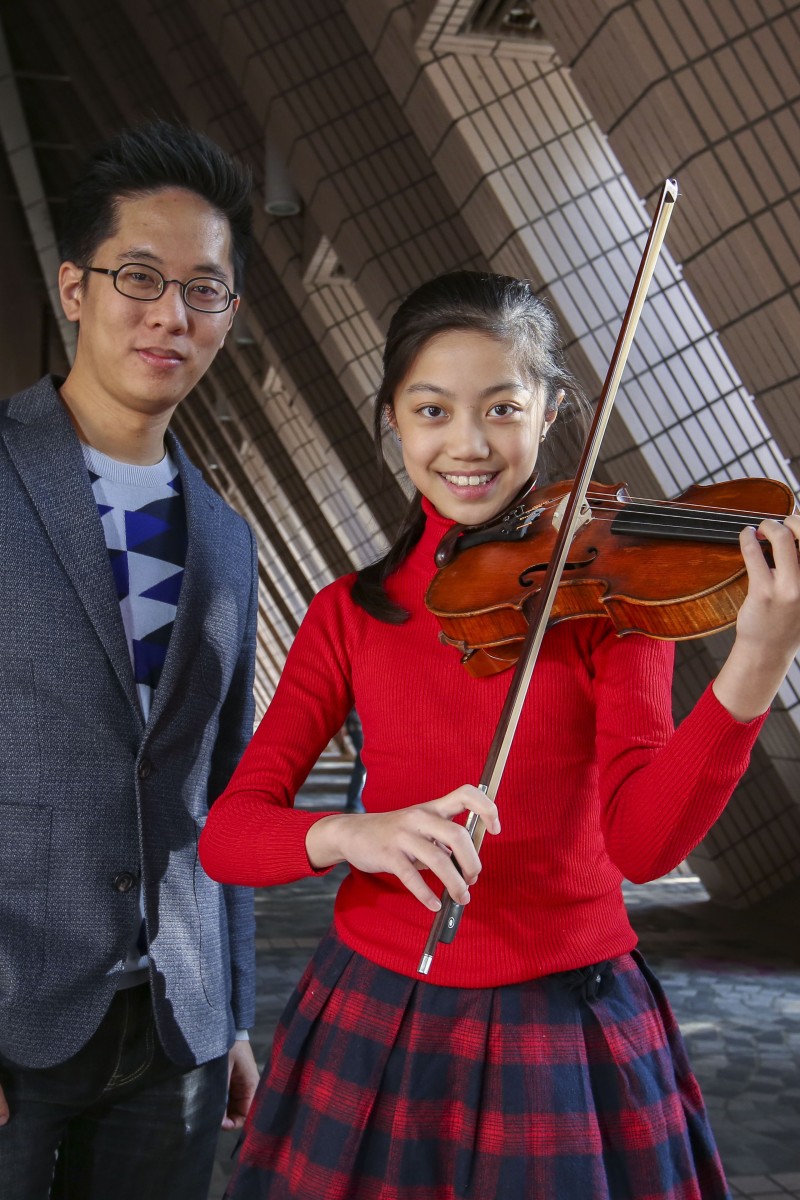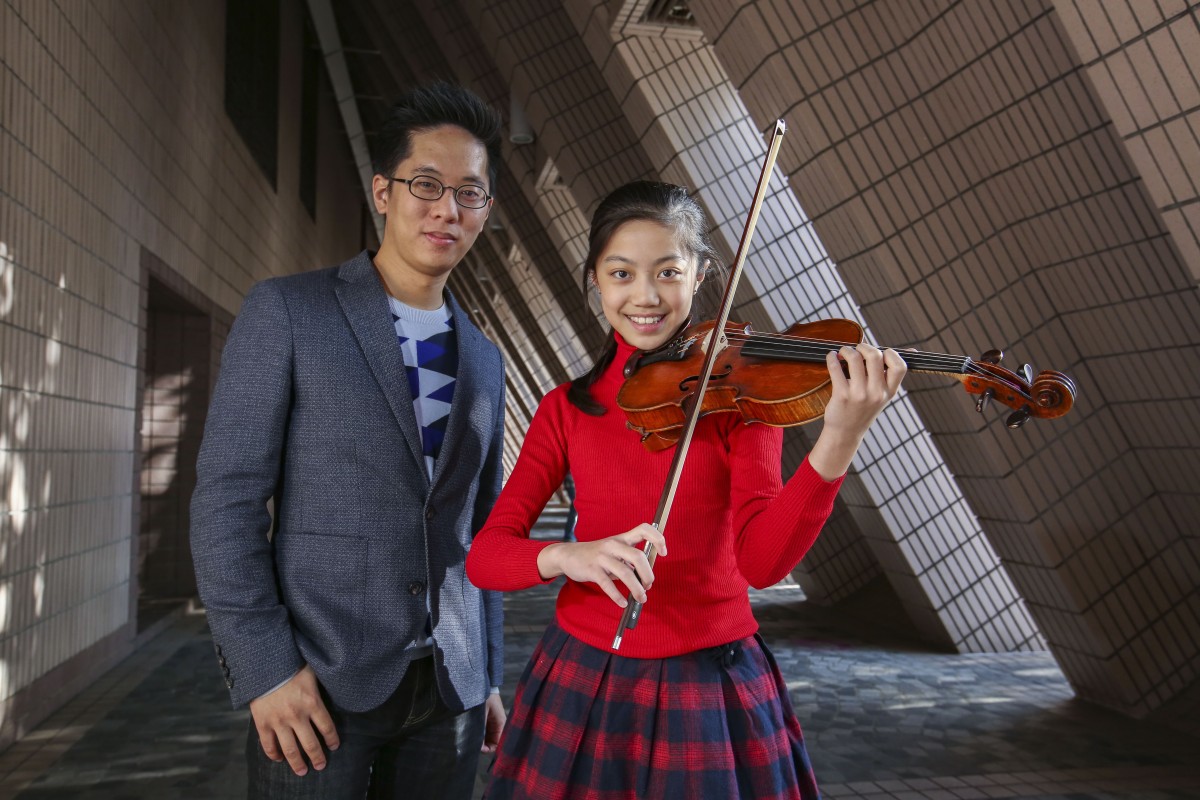
Why classical music is for everyone and not just professional musicians
A 12-year-old Hong Kong violinist and the HK Philharmonic’s director of artistic planning love classical music, and they want you to appreciate it too
 Fung Lam (left), and Hannah Tam Wan-ching say that learning to love classical music takes time.
Fung Lam (left), and Hannah Tam Wan-ching say that learning to love classical music takes time. Hannah Tam Wan-ching isn’t discriminate in her love of music. The St. Paul’s Co-educational College student loves everything, from classical to pop – but it’s classical music where her talents lie. Hannah, 12, is a violinist and will be performing in HK Philharmonic’s Ignite the passion for music! Bravo, young virtuosos! concert next weekend.
The Form One student, who has won many international violin competitions, says she started listening to classical music when she was very young. This is something that Lam Fung, composer and HK Philharmonic’s director of artistic planning, did too. Young Post talked to both Hannah and Lam about life, music, and how to truly appreciate the classics.
Be open-minded and don’t push yourself
Lam says that, growing up, he was allowed to choose whatever music he liked for background noise during family dinners, and a lot of the time he’d pick classical music.
Classical pieces last a long time. If you’re used to listening to pop, where songs typically last no longer than four minutes, then a classical piece might try your patience at first.
You also need to keep an open mind when listening – you might not love a piece the first time you hear it, but it could grow on you the second, third, or fourth time you hear it. The more pieces you listen to, the easier it becomes to figure out what sort of classical music you prefer. However, don’t try to love a piece just because others do – everyone has different tastes, and that’s okay.
Train your brain
Like almost everything else in the world, appreciating classical music is a bit of a learning process, says Lam. The key to appreciating classical music is to recognise that there are repetitions, and references to parts that have already ended. If you tend to listen to something and forget what it sounded like three seconds later, then you won’t be able to recognise how much work a composer puts into their work.
“A good piece ‘echoes’,” Lam adds. “That’s what makes it interesting.”
Learn the context
Hannah says she found classical music a lot more interesting once she took the time to learn about the composers behind the music. Once she learns about a composer’s life, she can translate that interest from the person to their work. Lam adds that doing this helps you understand the music better too – because you learn about the historical setting in which a piece was developed, or why a composer’s style is the way it is.
It’s everywhere!
If you want to start listening, but you’re not sure where to start, then Hannah and Lam suggest listening to tunes from films. John Williams is a very famous music composer, and has created many melodies for films such as the Star Wars series, the Indiana Jones series, and Schindler’s List. These film scores are some of the most well-known pieces of classical music in cinematic history.
You’ll have heard of plenty of other pieces too, melodies and riffs that you might not know come from famous classical pieces. Try Canon in D, which is often played at weddings, Beethoven’s Symphony No. 5, which you often hear on TV, and Beethoven’s Ode to Joy, which many of you will have heard when you were little.
Lam says that, even though you might have only heard the first part of a piece, they are very distinctive and memorable for a reason – they’re easy to listen to, and catchy.
Where can I find classical music?
As much of a distraction as they can be when you’re trying to study, YouTube and Spotify are good resources for finding just about anything to listen to. Browse through, and see what appeals to you.
Live concerts are better, of course, with a lively and vibrant atmosphere that gets lost when listening to music through your headphones, says Hannah. She has been attending concerts since she was four.
To get you started, both musicians have come up with their music recommendations for different occasions. Check them out!
Lam
Sunny days: Tchaikovsky’s Piano Concerto No. 1, Sibelius’ Symphony No. 5, and Beethoven’s Symphony No. 7
Rainy days: Bach’s Goldberg Variations, Debussy’s Prelude to the Afternoon of a Faun, and Rachmaninov’s Piano Concerto No. 2
School holidays: Elgar’s Variations on an Original Theme ‘Enigma’, and Holst’s The Planets
Before going to bed: Dvorak’s Silent Woods, and Bryars’ Cello Concerto
Before exams: Mozart’s Divertimento, K. 136-138, and Haydn’s Cello Concertos in C & D
Hannah
Sunny days: Vivaldi’s Spring, and Beethoven’s Sonata No. 5 in F Major Op. 24
Rainy days: Vivaldi’s Summer
School holidays: Sarasate’s Zapateado Op. 23, Wieniawski’s Scherzo Tarantelle Op. 16, and Wieniawski’s Polonaise in A major
Before going to bed: Beethoven’s Romance Op. 40 & 50, Saint Saens’ The Swan, and Kreisler’s Midnight Bells
Before exams: John Williams’ Schindler’s List, and Massenet’s Méditation (Thaïs)
